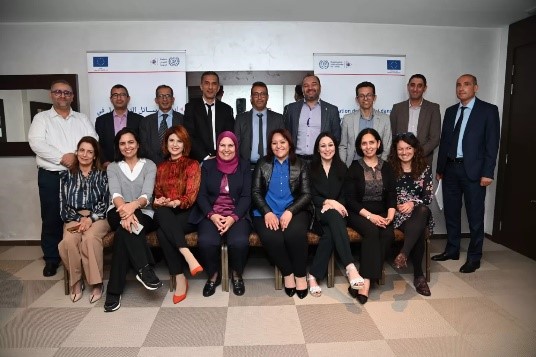METI Policy Working Groups met in Tunis

The Policy Working Group of the regional project "Mainstreaming Employment into Trade and Investment " (METI), as well as representatives; ministries, social partners, national technical agencies and trade and investment support structures, development banks, and local actors in the aromatic and medicinal plants sector, met for the fourth time in Tunis since the beginning of the implementation of the project in order to validate the study of the impact of infrastructure investments in Tunisia on job creation and trade, and to pre-validate the study on the analysis of the Value Chain of Aromatic and Medicinal Plants.
This meeting was chaired by Mr. Mohamed Jamel Elifa, Director in charge of cooperation with regional and international organizations at MCDE in Tunisia and by Mr. David Andrevon, ILO Focal Point for Tunisia.
Mr. ELIFA stressed that the crises in the southern Mediterranean countries have slowed down the indicators for achieving the Sustainable Development Goals (SDGs) and that this project is an example of cooperation that supports national and regional efforts towards the creation of decent jobs for young women and men, and towards more equitable and sustainable development.
Mr. Andrevon, in turn, recalled the role of the METI programme to facilitate the transfer of expertise on the interaction between trade and investment and their effects on employment, to strengthen political and social dialogue at the national level, and to encourage capacity building and knowledge sharing at the regional level.
The first session presented the study of the impact of infrastructure investments in Tunisia on job creation and trade, with a focus on the PAP SONEDE-Potable Water project. Discussions with the PWG and participants representing key institutions in this area helped refine recommendations for aligning these investments with employment promotion and trade.
The second session was an opportunity to share with the audience the preliminary results of the Value Chain Analysis of Aromatic and Medicinal Plants. The exploitation of the preliminary results of this study made it possible to furnish the Third Session in the form of a foresight exercise around the skills necessary to improve the sector.
Following these consultations, the main findings of the reports will be published and disseminated to policy makers and key stakeholders. These exchanges will serve to feed the final reports by collecting participants' contributions and highlighting the specific needs of the market, thus consolidating efforts to effectively integrate employment into the commercial fabric and investment in Tunisia.
This space for dialogue thus contributes to the promotion of employment and trade, creating an environment conducive to collaboration between policymakers, national experts and local stakeholders.
